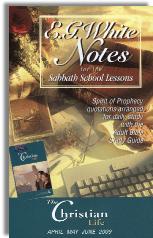|
||||||||||||||
Commentary on "Love"
Day 2: Sunday, March 29, 2009
In Sunday's lesson the author opens by making the point that we all need love from family, friends, and community—"But let's be clear: True love does not begin with us. The capacity for love is created in us by our Creator. (See Genesis 1:26 and John 3:16).
He continues by saying God's love always precedes our love and quotes from The Acts of the Apostles, p. 551: True "love is not an impulse, but a divine principle, a permanent power. The unconsecrated heart cannot originate or produce it. Only in the heart where Jesus reigns is it found. We love Him, because He first loved us' [1 John 4:19]. In the heart renewed by divine grace, love is the ruling principle of action."
Then the author quotes C.S Lewis' The Four Loves: "We [must] begin at the real beginning, with love as the Divine energy. This primal love is Gift-love. In God there is no hunger that needs to be filled, only plenteousness that desires to give."
The lesson ends with these questions: "From your own experience, what is the difference between human love and God's love? What kind of human love best exemplifies God's love? How can we better manifest God's love in our own lives?"
On page 7 of the teacher's edition, under the heading "Learning outline:" No. 1, sub-head A, says this: The Message Bible translates this text as "let us make human beings . . . reflecting our nature." Because we reflect God's nature, and because God is love, we should reflect this love through our actions. How can we do this in our lives?
The second heading, "Experiencing Love", subhead A, states, "God's extraordinary love is highlighted throughout Scripture. Creation, the gift of the Sabbath, the plan of salvation, and the Spirit of prophecy all affirm God's loving nature. Share specific ways you have experienced God's unfathomable love."
Under the third subhead, "Reflecting Love", is this question: "our reaction to the love of God should be love for one another. This can be hard to do in a world full of sin. How can you better reflect His love?"
Problems
Again, this lesson is idealistic and confusing without being helpful because it completely ignores the fact that love is only possible when we are born again of the Spirit and the love of God has been poured out within our hearts by the Holy Spirit.
The question and assumption in the teacher's edition about being created in God's image, thus reflecting His nature, and since He is love, we should reflect this love, refuses to address the most basic statement of Genesis 1:26. The text says: "Then God said, "Let us make man in our image, after our likeness. And let them have dominion over the fish of the sea and over the birds of the heavens and over the livestock and over all the earth and over every creeping thing that creeps on the earth."
This image of God in which we were created is not "love" per se. Love, rather, is an attribute of God. We were made to love, to be sure, but "love" is not the "image" of God. Love, on the contrary, is what God characterizes God's invisible attributes: His eternal power and divine nature (Romans 1:20).
John 4:24 tells us what God "is" and what we, therefore, are: "God is spirit, and those who worship him must worship in spirit and truth."
Part of the image of God in which we have been made is His very essence: spirit. God does not have a physical body per se. While Jesus does forever share our humanity, the Father and the Spirit do not. They ARE "spirit".
We are to worship Him "in spirit and truth". This statement of Jesus' reveals that we also have "spirits" that can and must worship God. Whatever this immaterial part of humanity is, it is related to God's spirit. It is a significant part of being made in God's image.
The lesson ignores that we are made in God's image by being made with spirits that can know and worship God.
Since we are born dead in sin, by nature objects of wrath (Ephesians 2:1-3), we are not able to love with real love as natural humans. While we may be drawn to others and need others affection, natural human love is always self-centered. We can only love when we are born of the Spirit and made spiritually alive, when the Holy Spirit pours out God's own love within our hearts. This is the only way to love.
Moreover, the Bible itself states how God's love is affirmed. God sent His Son to save the world and give eternal life to all who believe in Him (John 3:16-1). "God demonstrated His own love in that while we were yet sinners, Christ died for us"(Romans 5:8).
Creation, "the gift of Sabbath, the plan of salvation, and the Spirit of prophecy" are never cited as evidences of God's love. While God's creation and salvation of us, His oracles and gifts all do affirm His love, these things listed in the teacher's edition are not speaking of the biblical record of these events. The quarterly is specifically referring to Adventist distinctive doctrines.
The Adventist beliefs about creation, Sabbath, "the plan of salvation", and the Spirit of prophecy are all non-biblical and do nothing to affirm God's loving nature.
We cannot conclude anything beyond what the Bible actually states. The Bible clearly repeats that the evidence of God's love is the fact that He sent Jesus to die as a ransom for sinners. If we deviate from this biblical fact and embrace doctrinal distinctives as evidence of the divine attribute of Love, we distort God's love and embrace a falsehood.
The lesson summary on page 7 of the teacher's edition again backs us into a corner: "God is love. When we allow Christ to abide within us, this love will be revealed in our hearts."
How does one "allow" Christ's love to abide in Him? This central question remains unaddressed.
The fact is that God calls us to admit our deep sin and repent before God, humbling ourselves before the Lord Jesus and allowing His blood to cover us and wash us clean. When we do that, god Himself pours His love into our hearts when the Holy Spirit seals us (Ephesians 1:13-14, Romans 5:8). Christ Himself abides in us, and nothing can take us out of His hand.(John 10:27-30).
We are not left to try and figure out how to "allow" Christ to abide in us. Rather, God Himself completes what He begins in us (Philippians 1:6).
The question about differentiating between God's love and human love is a moot point. Human love is as filthy rags; it is part of the domain of darkness. God's love is eternal; it is what God gives us when He transfers us to the kingdom of His beloved Son from the domain of darkness (Colossians 1:13).
We don't "try" to "better manifest God's love". We can NEVER manifest God's love. Instead, God pours His love into us, and because we are made alive by His Spirit, God Himself loves others through us. It is never us emulating God's love. Always, when we love like God loves, that miracle is the result of God Himself making our spirits alive with His own life and manifesting Himself through us.
Summary
- "Love" is not the image of God in which we were created. Love is the central attribute of God. Rather, our spirits are an essential part of our being made in God's image.
- Understanding that we have human spirits is the core of understanding how we love as God loves. Until our spirits are brought to life by the Holy Spirit, we are totally unable to love as God loves. We cannot emulate or improve our ability to love as God loves. We can only receive this ability by being born again and having God pour out His love in our hearts.
- Adventist doctrines to not affirm God's loving nature. The Bible states that the proof of God's love is His sending Jesus to die as an offering for human sin. It is this sacrifice, not the Adventist doctrines of Sabbath, Creation, the "plan of salvation", or the "spirit of prophecy" (more specifically, the writings of Ellen G. White), that confirm God's love.
- Christ's abiding in us is not the result of our "allowing" Him to be there. God makes us alive with Christ while we are still dead in our sins and seats us with Him in heavenly place (Ephesians 2:1-6). God complete what He begins in us. (Phil 1:6). Christ's love in our lives is totally a gift of His grace to us, not something we "develop" by trying harder.
Copyright 2008 BibleStudiesForAdventists.com. All rights reserved. Revised March 28, 2009. This website is published by Life Assurance Ministries, Glendale, Arizona, USA, the publisher of Proclamation! Magazine. Contact email: BibleStudiesForAdventists@gmail.com.
The Sabbath School Bible Study Guide and the corresponding E.G. White Notes are published by Pacific Press Publishing Association, which is owned and operated by the Seventh-day Adventist church. The current quarter's editions are pictured above.
Official Adventist Resources
Standard Edition Study Guide Week 1
Teacher's Edition Study Guide Week 1
Easy Reading Edition Study Guide Week 1
Search the Complete Published Ellen G. White Writings


